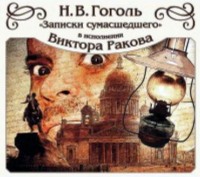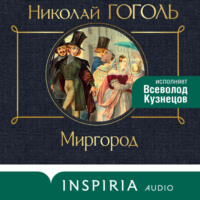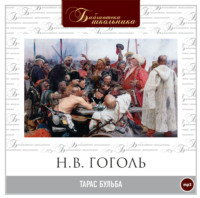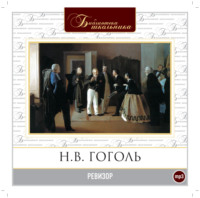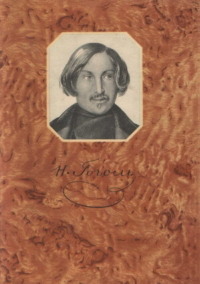 полная версия
полная версияTaras Bulba, and Other Tales
His younger brother, Andrii, had livelier and more fully developed feelings. He learned more willingly and without the effort with which strong and weighty characters generally have to make in order to apply themselves to study. He was more inventive-minded than his brother, and frequently appeared as the leader of dangerous expeditions; sometimes, thanks to the quickness of his mind, contriving to escape punishment when his brother Ostap, abandoning all efforts, stripped off his gaberdine and lay down upon the floor without a thought of begging for mercy. He too thirsted for action; but, at the same time, his soul was accessible to other sentiments. The need of love burned ardently within him. When he had passed his eighteenth year, woman began to present herself more frequently in his dreams; listening to philosophical discussions, he still beheld her, fresh, black-eyed, tender; before him constantly flitted her elastic bosom, her soft, bare arms; the very gown which clung about her youthful yet well-rounded limbs breathed into his visions a certain inexpressible sensuousness. He carefully concealed this impulse of his passionate young soul from his comrades, because in that age it was held shameful and dishonourable for a Cossack to think of love and a wife before he had tasted battle. On the whole, during the last year, he had acted more rarely as leader to the bands of students, but had roamed more frequently alone, in remote corners of Kief, among low-roofed houses, buried in cherry orchards, peeping alluringly at the street. Sometimes he betook himself to the more aristocratic streets, in the old Kief of to-day, where dwelt Little Russian and Polish nobles, and where houses were built in more fanciful style. Once, as he was gaping along, an old-fashioned carriage belonging to some Polish noble almost drove over him; and the heavily moustached coachman, who sat on the box, gave him a smart cut with his whip. The young student fired up; with thoughtless daring he seized the hind-wheel with his powerful hands and stopped the carriage. But the coachman, fearing a drubbing, lashed his horses; they sprang forward, and Andrii, succeeding happily in freeing his hands, was flung full length on the ground with his face flat in the mud. The most ringing and harmonious of laughs resounded above him. He raised his eyes and saw, standing at a window, a beauty such as he had never beheld in all his life, black-eyed, and with skin white as snow illumined by the dawning flush of the sun. She was laughing heartily, and her laugh enhanced her dazzling loveliness. Taken aback he gazed at her in confusion, abstractedly wiping the mud from his face, by which means it became still further smeared. Who could this beauty be? He sought to find out from the servants, who, in rich liveries, stood at the gate in a crowd surrounding a young guitar-player; but they only laughed when they saw his besmeared face and deigned him no reply. At length he learned that she was the daughter of the Waiwode of Koven, who had come thither for a time. The following night, with the daring characteristic of the student, he crept through the palings into the garden and climbed a tree which spread its branches upon the very roof of the house. From the tree he gained the roof, and made his way down the chimney straight into the bedroom of the beauty, who at that moment was seated before a lamp, engaged in removing the costly earrings from her ears. The beautiful Pole was so alarmed on suddenly beholding an unknown man that she could not utter a single word; but when she perceived that the student stood before her with downcast eyes, not daring to move a hand through timidity, when she recognised in him the one who had fallen in the street, laughter again overpowered her.
Moreover, there was nothing terrible about Andrii’s features; he was very handsome. She laughed heartily, and amused herself over him for a long time. The lady was giddy, like all Poles; but her eyes—her wondrous clear, piercing eyes—shot one glance, a long glance. The student could not move hand or foot, but stood bound as in a sack, when the Waiwode’s daughter approached him boldly, placed upon his head her glittering diadem, hung her earrings on his lips, and flung over him a transparent muslin chemisette with gold-embroidered garlands. She adorned him, and played a thousand foolish pranks, with the childish carelessness which distinguishes the giddy Poles, and which threw the poor student into still greater confusion.
He cut a ridiculous feature, gazing immovably, and with open mouth, into her dazzling eyes. A knock at the door startled her. She ordered him to hide himself under the bed, and, as soon as the disturber was gone, called her maid, a Tatar prisoner, and gave her orders to conduct him to the garden with caution, and thence show him through the fence. But our student this time did not pass the fence so successfully. The watchman awoke, and caught him firmly by the foot; and the servants, assembling, beat him in the street, until his swift legs rescued him. After that it became very dangerous to pass the house, for the Waiwode’s domestics were numerous. He met her once again at church. She saw him, and smiled pleasantly, as at an old acquaintance. He saw her once more, by chance; but shortly afterwards the Waiwode departed, and, instead of the beautiful black-eyed Pole, some fat face or other gazed from the window. This was what Andrii was thinking about, as he hung his head and kept his eyes on his horse’s mane.
In the meantime the steppe had long since received them all into its green embrace; and the high grass, closing round, concealed them, till only their black Cossack caps appeared above it.
“Eh, eh, why are you so quiet, lads?” said Bulba at length, waking from his own reverie. “You’re like monks. Now, all thinking to the Evil One, once for all! Take your pipes in your teeth, and let us smoke, and spur on our horses so swiftly that no bird can overtake us.”
And the Cossacks, bending low on their horses’ necks, disappeared in the grass. Their black caps were no longer to be seen; a streak of trodden grass alone showed the trace of their swift flight.
The sun had long since looked forth from the clear heavens and inundated the steppe with his quickening, warming light. All that was dim and drowsy in the Cossacks’ minds flew away in a twinkling: their hearts fluttered like birds.
The farther they penetrated the steppe, the more beautiful it became. Then all the South, all that region which now constitutes New Russia, even as far as the Black Sea, was a green, virgin wilderness. No plough had ever passed over the immeasurable waves of wild growth; horses alone, hidden in it as in a forest, trod it down. Nothing in nature could be finer. The whole surface resembled a golden-green ocean, upon which were sprinkled millions of different flowers. Through the tall, slender stems of the grass peeped light-blue, dark-blue, and lilac star-thistles; the yellow broom thrust up its pyramidal head; the parasol-shaped white flower of the false flax shimmered on high. A wheat-ear, brought God knows whence, was filling out to ripening. Amongst the roots of this luxuriant vegetation ran partridges with outstretched necks. The air was filled with the notes of a thousand different birds. On high hovered the hawks, their wings outspread, and their eyes fixed intently on the grass. The cries of a flock of wild ducks, ascending from one side, were echoed from God knows what distant lake. From the grass arose, with measured sweep, a gull, and skimmed wantonly through blue waves of air. And now she has vanished on high, and appears only as a black dot: now she has turned her wings, and shines in the sunlight. Oh, steppes, how beautiful you are!
Our travellers halted only a few minutes for dinner. Their escort of ten Cossacks sprang from their horses and undid the wooden casks of brandy, and the gourds which were used instead of drinking vessels. They ate only cakes of bread and dripping; they drank but one cup apiece to strengthen them, for Taras Bulba never permitted intoxication upon the road, and then continued their journey until evening.
In the evening the whole steppe changed its aspect. All its varied expanse was bathed in the last bright glow of the sun; and as it grew dark gradually, it could be seen how the shadow flitted across it and it became dark green. The mist rose more densely; each flower, each blade of grass, emitted a fragrance as of ambergris, and the whole steppe distilled perfume. Broad bands of rosy gold were streaked across the dark blue heaven, as with a gigantic brush; here and there gleamed, in white tufts, light and transparent clouds: and the freshest, most enchanting of gentle breezes barely stirred the tops of the grass-blades, like sea-waves, and caressed the cheek. The music which had resounded through the day had died away, and given place to another. The striped marmots crept out of their holes, stood erect on their hind legs, and filled the steppe with their whistle. The whirr of the grasshoppers had become more distinctly audible. Sometimes the cry of the swan was heard from some distant lake, ringing through the air like a silver trumpet. The travellers, halting in the midst of the plain, selected a spot for their night encampment, made a fire, and hung over it the kettle in which they cooked their oatmeal; the steam rising and floating aslant in the air. Having supped, the Cossacks lay down to sleep, after hobbling their horses and turning them out to graze. They lay down in their gaberdines. The stars of night gazed directly down upon them. They could hear the countless myriads of insects which filled the grass; their rasping, whistling, and chirping, softened by the fresh air, resounded clearly through the night, and lulled the drowsy ear. If one of them rose and stood for a time, the steppe presented itself to him strewn with the sparks of glow-worms. At times the night sky was illumined in spots by the glare of burning reeds along pools or river-bank; and dark flights of swans flying to the north were suddenly lit up by the silvery, rose-coloured gleam, till it seemed as though red kerchiefs were floating in the dark heavens.
The travellers proceeded onward without any adventure. They came across no villages. It was ever the same boundless, waving, beautiful steppe. Only at intervals the summits of distant forests shone blue, on one hand, stretching along the banks of the Dnieper. Once only did Taras point out to his sons a small black speck far away amongst the grass, saying, “Look, children! yonder gallops a Tatar.” The little head with its long moustaches fixed its narrow eyes upon them from afar, its nostrils snuffing the air like a greyhound’s, and then disappeared like an antelope on its owner perceiving that the Cossacks were thirteen strong. “And now, children, don’t try to overtake the Tatar! You would never catch him to all eternity; he has a horse swifter than my Devil.” But Bulba took precautions, fearing hidden ambushes. They galloped along the course of a small stream, called the Tatarka, which falls into the Dnieper; rode into the water and swam with their horses some distance in order to conceal their trail. Then, scrambling out on the bank, they continued their road.
Three days later they were not far from the goal of their journey. The air suddenly grew colder: they could feel the vicinity of the Dnieper. And there it gleamed afar, distinguishable on the horizon as a dark band. It sent forth cold waves, spreading nearer, nearer, and finally seeming to embrace half the entire surface of the earth. This was that section of its course where the river, hitherto confined by the rapids, finally makes its own away and, roaring like the sea, rushes on at will; where the islands, flung into its midst, have pressed it farther from their shores, and its waves have spread widely over the earth, encountering neither cliffs nor hills. The Cossacks, alighting from their horses, entered the ferry-boat, and after a three hours’ sail reached the shores of the island of Khortitz, where at that time stood the Setch, which so often changed its situation.
A throng of people hastened to the shore with boats. The Cossacks arranged the horses’ trappings. Taras assumed a stately air, pulled his belt tighter, and proudly stroked his moustache. His sons also inspected themselves from head to foot, with some apprehension and an undefined feeling of satisfaction; and all set out together for the suburb, which was half a verst from the Setch. On their arrival, they were deafened by the clang of fifty blacksmiths’ hammers beating upon twenty-five anvils sunk in the earth. Stout tanners seated beneath awnings were scraping ox-hides with their strong hands; shop-keepers sat in their booths, with piles of flints, steels, and powder before them; Armenians spread out their rich handkerchiefs; Tatars turned their kabobs upon spits; a Jew, with his head thrust forward, was filtering some corn-brandy from a cask. But the first man they encountered was a Zaporozhetz5 who was sleeping in the very middle of the road with legs and arms outstretched. Taras Bulba could not refrain from halting to admire him. “How splendidly developed he is; phew, what a magnificent figure!” he said, stopping his horse. It was, in fact, a striking picture. This Zaporozhetz had stretched himself out in the road like a lion; his scalp-lock, thrown proudly behind him, extended over upwards of a foot of ground; his trousers of rich red cloth were spotted with tar, to show his utter disdain for them. Having admired to his heart’s content, Bulba passed on through the narrow street, crowded with mechanics exercising their trades, and with people of all nationalities who thronged this suburb of the Setch, resembling a fair, and fed and clothed the Setch itself, which knew only how to revel and burn powder.
At length they left the suburb behind them, and perceived some scattered kurens6, covered with turf, or in Tatar fashion with felt. Some were furnished with cannon. Nowhere were any fences visible, or any of those low-roofed houses with verandahs supported upon low wooden pillars, such as were seen in the suburb. A low wall and a ditch, totally unguarded, betokened a terrible degree of recklessness. Some sturdy Zaporozhtzi lying, pipe in mouth, in the very road, glanced indifferently at them, but never moved from their places. Taras threaded his way carefully among them, with his sons, saying, “Good-day, gentles.”—“Good-day to you,” answered the Zaporozhtzi. Scattered over the plain were picturesque groups. From their weatherbeaten faces, it was plain that all were steeled in battle, and had faced every sort of bad weather. And there it was, the Setch! There was the lair from whence all those men, proud and strong as lions, issued forth! There was the spot whence poured forth liberty and Cossacks all over the Ukraine.
The travellers entered the great square where the council generally met. On a huge overturned cask sat a Zaporozhetz without his shirt; he was holding it in his hands, and slowly sewing up the holes in it. Again their way was stopped by a whole crowd of musicians, in the midst of whom a young Zaporozhetz was dancing, with head thrown back and arms outstretched. He kept shouting, “Play faster, musicians! Begrudge not, Thoma, brandy to these orthodox Christians!” And Thoma, with his blackened eye, went on measuring out without stint, to every one who presented himself, a huge jugful.
About the youthful Zaporozhetz four old men, moving their feet quite briskly, leaped like a whirlwind to one side, almost upon the musicians’ heads, and, suddenly, retreating, squatted down and drummed the hard earth vigorously with their silver heels. The earth hummed dully all about, and afar the air resounded with national dance tunes beaten by the clanging heels of their boots.
But one shouted more loudly than all the rest, and flew after the others in the dance. His scalp-lock streamed in the wind, his muscular chest was bare, his warm, winter fur jacket was hanging by the sleeves, and the perspiration poured from him as from a pig. “Take off your jacket!” said Taras at length: “see how he steams!”—“I can’t,” shouted the Cossack. “Why?”—“I can’t: I have such a disposition that whatever I take off, I drink up.” And indeed, the young fellow had not had a cap for a long time, nor a belt to his caftan, nor an embroidered neckerchief: all had gone the proper road. The throng increased; more folk joined the dancer: and it was impossible to observe without emotion how all yielded to the impulse of the dance, the freest, the wildest, the world has ever seen, still called from its mighty originators, the Kosachka.
“Oh, if I had no horse to hold,” exclaimed Taras, “I would join the dance myself.”
Meanwhile there began to appear among the throng men who were respected for their prowess throughout all the Setch—old greyheads who had been leaders more than once. Taras soon found a number of familiar faces. Ostap and Andrii heard nothing but greetings. “Ah, it is you, Petcheritza! Good day, Kozolup!”—“Whence has God brought you, Taras?”—“How did you come here, Doloto? Health to you, Kirdyaga! Hail to you, Gustui! Did I ever think of seeing you, Remen?” And these heroes, gathered from all the roving population of Eastern Russia, kissed each other and began to ask questions. “But what has become of Kasyan? Where is Borodavka? and Koloper? and Pidsuitok?” And in reply, Taras Bulba learned that Borodavka had been hung at Tolopan, that Koloper had been flayed alive at Kizikirmen, that Pidsuitok’s head had been salted and sent in a cask to Constantinople. Old Bulba hung his head and said thoughtfully, “They were good Cossacks.”
CHAPTER III
Taras Bulba and his sons had been in the Setch about a week. Ostap and Andrii occupied themselves but little with the science of war. The Setch was not fond of wasting time in warlike exercises. The young generation learned these by experience alone, in the very heat of battles, which were therefore incessant. The Cossacks thought it a nuisance to fill up the intervals of this instruction with any kind of drill, except perhaps shooting at a mark, and on rare occasions with horse-racing and wild-beast hunts on the steppes and in the forests. All the rest of the time was devoted to revelry—a sign of the wide diffusion of moral liberty. The whole of the Setch presented an unusual scene: it was one unbroken revel; a ball noisily begun, which had no end. Some busied themselves with handicrafts; others kept little shops and traded; but the majority caroused from morning till night, if the wherewithal jingled in their pockets, and if the booty they had captured had not already passed into the hands of the shopkeepers and spirit-sellers. This universal revelry had something fascinating about it. It was not an assemblage of topers, who drank to drown sorrow, but simply a wild revelry of joy. Every one who came thither forgot everything, abandoned everything which had hitherto interested him. He, so to speak, spat upon his past and gave himself recklessly up to freedom and the good-fellowship of men of the same stamp as himself—idlers having neither relatives nor home nor family, nothing, in short, save the free sky and the eternal revel of their souls. This gave rise to that wild gaiety which could not have sprung from any other source. The tales and talk current among the assembled crowd, reposing lazily on the ground, were often so droll, and breathed such power of vivid narration, that it required all the nonchalance of a Zaporozhetz to retain his immovable expression, without even a twitch of the moustache—a feature which to this day distinguishes the Southern Russian from his northern brethren. It was drunken, noisy mirth; but there was no dark ale-house where a man drowns thought in stupefying intoxication: it was a dense throng of schoolboys.
The only difference as regarded the students was that, instead of sitting under the pointer and listening to the worn-out doctrines of a teacher, they practised racing with five thousand horses; instead of the field where they had played ball, they had the boundless borderlands, where at the sight of them the Tatar showed his keen face and the Turk frowned grimly from under his green turban. The difference was that, instead of being forced to the companionship of school, they themselves had deserted their fathers and mothers and fled from their homes; that here were those about whose neck a rope had already been wound, and who, instead of pale death, had seen life, and life in all its intensity; those who, from generous habits, could never keep a coin in their pockets; those who had thitherto regarded a ducat as wealth, and whose pockets, thanks to the Jew revenue-farmers, could have been turned wrong side out without any danger of anything falling from them. Here were students who could not endure the academic rod, and had not carried away a single letter from the schools; but with them were also some who knew about Horace, Cicero, and the Roman Republic. There were many leaders who afterwards distinguished themselves in the king’s armies; and there were numerous clever partisans who cherished a magnanimous conviction that it was of no consequence where they fought, so long as they did fight, since it was a disgrace to an honourable man to live without fighting. There were many who had come to the Setch for the sake of being able to say afterwards that they had been there and were therefore hardened warriors. But who was not there? This strange republic was a necessary outgrowth of the epoch. Lovers of a warlike life, of golden beakers and rich brocades, of ducats and gold pieces, could always find employment there. The lovers of women alone could find naught, for no woman dared show herself even in the suburbs of the Setch.
It seemed exceedingly strange to Ostap and Andrii that, although a crowd of people had come to the Setch with them, not a soul inquired, “Whence come these men? who are they? and what are their names?” They had come thither as though returning to a home whence they had departed only an hour before. The new-comer merely presented himself to the Koschevoi, or head chief of the Setch, who generally said, “Welcome! Do you believe in Christ?”—“I do,” replied the new-comer. “And do you believe in the Holy Trinity?”—“I do.”—“And do you go to church?”—“I do.” “Now cross yourself.” The new-comer crossed himself. “Very good,” replied the Koschevoi; “enter the kuren where you have most acquaintances.” This concluded the ceremony. And all the Setch prayed in one church, and were willing to defend it to their last drop of blood, although they would not hearken to aught about fasting or abstinence. Jews, Armenians, and Tatars, inspired by strong avarice, took the liberty of living and trading in the suburbs; for the Zaporozhtzi never cared for bargaining, and paid whatever money their hand chanced to grasp in their pocket. Moreover, the lot of these gain-loving traders was pitiable in the extreme. They resembled people settled at the foot of Vesuvius; for when the Zaporozhtzi lacked money, these bold adventurers broke down their booths and took everything gratis. The Setch consisted of over sixty kurens, each of which greatly resembled a separate independent republic, but still more a school or seminary of children, always ready for anything. No one had any occupation; no one retained anything for himself; everything was in the hands of the hetman of the kuren, who, on that account, generally bore the title of “father.” In his hands were deposited the money, clothes, all the provisions, oatmeal, grain, even the firewood. They gave him money to take care of. Quarrels amongst the inhabitants of the kuren were not unfrequent; and in such cases they proceeded at once to blows. The inhabitants of the kuren swarmed into the square, and smote each other with their fists, until one side had finally gained the upper hand, when the revelry began. Such was the Setch, which had such an attraction for young men.
Ostap and Andrii flung themselves into this sea of dissipation with all the ardour of youth, forgot in a trice their father’s house, the seminary, and all which had hitherto exercised their minds, and gave themselves wholly up to their new life. Everything interested them—the jovial habits of the Setch, and its chaotic morals and laws, which even seemed to them too strict for such a free republic. If a Cossack stole the smallest trifle, it was considered a disgrace to the whole Cossack community. He was bound to the pillar of shame, and a club was laid beside him, with which each passer-by was bound to deal him a blow until in this manner he was beaten to death. He who did not pay his debts was chained to a cannon, until some one of his comrades should decide to ransom him by paying his debts for him. But what made the deepest impression on Andrii was the terrible punishment decreed for murder. A hole was dug in his presence, the murderer was lowered alive into it, and over him was placed a coffin containing the body of the man he had killed, after which the earth was thrown upon both. Long afterwards the fearful ceremony of this horrible execution haunted his mind, and the man who had been buried alive appeared to him with his terrible coffin.


